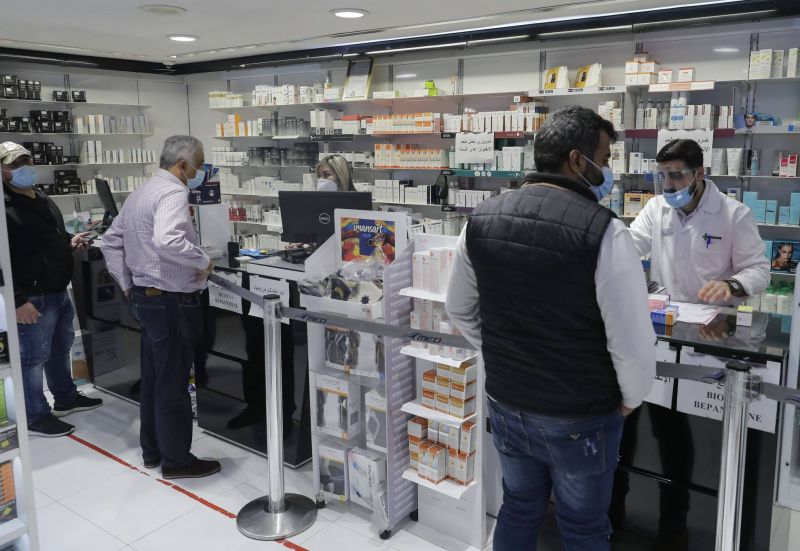
With the lifting of subsidies on many medicines now imminent, one question resonates among patients and their families: will we be able to afford the drugs we need? (Credit: Joseph Eid/AFP)
BEIRUT — Lebanon’s Health Ministry on Friday released a list of more than 1,500 imported and locally manufactured medicines that will no longer be fully subsidized, adding additional pressure to a health care sector already on its knees amid a crippling economic crisis.
Caretaker Health Minister Hamad Hassan had announced earlier in the day that subsidies will be ended for medications currently priced at less than $8 on the official exchange rate, but that they will remain in place on medicines for chronic diseases and neurological disorders, infant formula and vaccines.
With the lira hitting a record low of LL24,000 to the US dollar Friday, the price of medications would skyrocket, increasing by 16 times once subsidies are removed. For example, a subsidized medicine that costs LL11,000 would be priced at LL176,000.
The head of Parliament’s Health Committee, Assem Araji, told L’Orient-Le Jour that drugs sold without a prescription will continue to be partially subsidized and sold at a rate of LL3,900. Araji maintained that this would prevent cheap, fully subsidized drugs from being smuggled and sold at higher prices abroad, which officials claim is a major factor contributing to drug shortages.
“All drug prices will increase in principle; however, the partial lifting of subsidies will undoubtedly curb drug smuggling,” Araji said. “We call on the security forces to do their job to this end; otherwise we will not be able to control smuggling,” he added.
Before, Banque du Liban subsidized pharmaceutical imports at a rate of LL1,507.5 to the dollar. However, amid widespread drug shortages, the ministry admitted in May that the central bank was not paying invoices from medical suppliers in a timely fashion and that as a result supplies were being held up in warehouses.
Lebanese Authorities said at the beginning of July that they would end subsidies on some drugs, while retaining them on a list of “priority medicines” only.
With supplies depleted and many shelves empty, pharmacists 10 days ago announced an open-ended strike, setting Tuesday as a deadline for the Health Ministry to furnish them with a list of medications that would remain subsidized. They broke their strike on Monday and Tuesday to open to sell medications to prescription holders only, before announcing they would resume it Friday morning as they had still received no list from the ministry.
The strike was spearheaded by pharmacists exhausted and frustrated by prolonged medicine shortages, Ghassan Al-Amine, head of the syndicate of pharmacy owners, told L’Orient Today, adding that the action was not centrally organized by his syndicate.
On Friday morning, L’Orient Today staff found that around half of the pharmacies in the Hamra, Verdun, Tallet al-Khayat, and Sakiye areas were shut, while all were closed in Mazraa and Jnah, and none appeared to have halted business in Haret Hreik.
Speaking with L’Orient Today on Friday morning, Hassan Abbas, owner of a pharmacy in Haret Hreik, said he agrees with the demands of his colleagues but would not participate in today’s closure because “his clients are his priority.”
“Our demands are simple,” said a pharmacy owner from Hamra participating in today’s closure. “We want the list to be able to price our products,” he said, adding that other “unessential products” should be set at the market exchange rate immediately to ensure sales and avoid monopolization.
“Subsidized medications have also been subjected to smuggling, thus with the release of the new list and with placing some on the free market rate, this issue will be avoided,” he added.
With the lifting of subsidies on many medicines now imminent, one question resonates among patients and their families: will we be able to afford the drugs we need?
“How will we be able to cope with the new reality?” asks Dana Awad, whose son has autism.
Awad fears the medications her child needs will not be included on the ministry’s subsidized list.
“Not finding my son’s medication is one agony, but finding them and not being able to pay [for them] would be another level of pain,” Awad said.
The head of the Association of Lebanese Pharmaceutical Importers and Wholesalers, Karim Gebara, told L’Orient-Le Jour, that he was skeptical of how effective ending subsidies would be.
Gebara explained that the Health Ministry’s decision requires importers to purchase medicines in dollars — which they must acquire from exchangers at the parallel market rate, which stood at about LL23,000 on Friday night — while having to sell them at a price of LL12,000, which translates to a 50 percent loss for importers.
“We will have to adopt the parallel market [when selling medicines]. Otherwise, we will not be able to import anything which will mean the problem will not be solved,” he said.
The Health Ministry declined a request for comment.